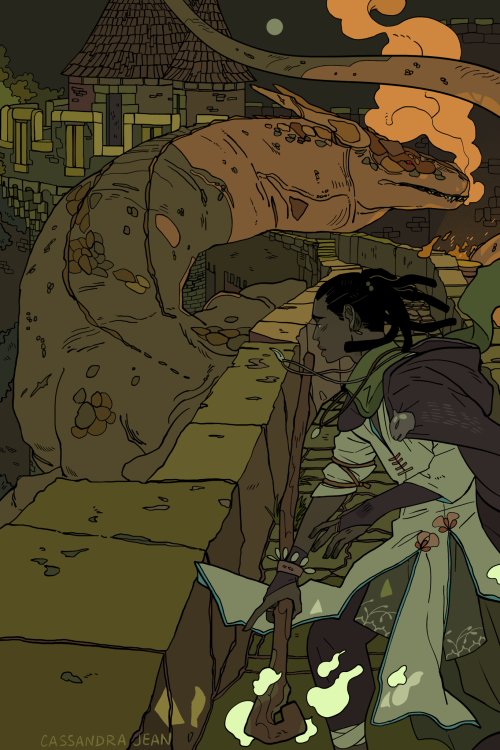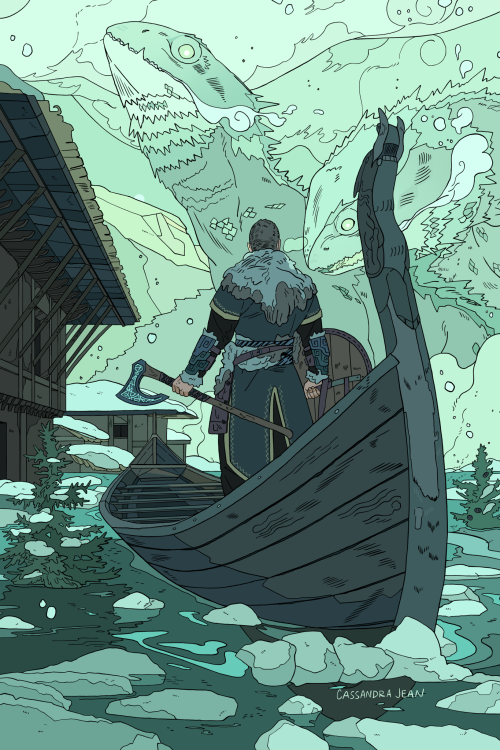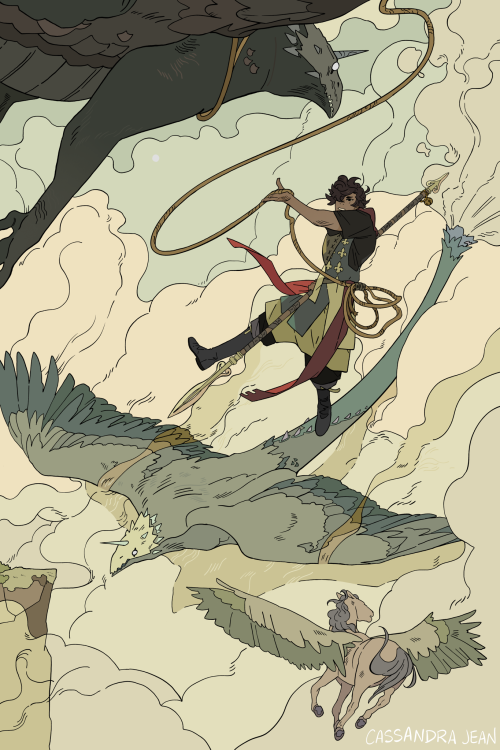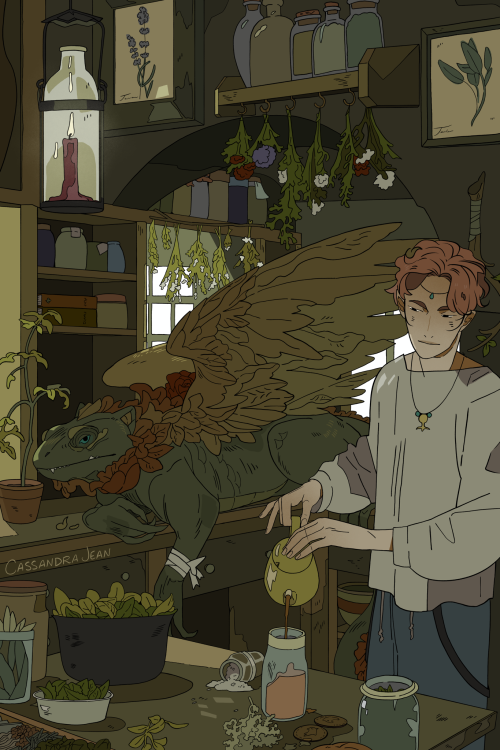The Full Dragon Series!! Each Creature From A Different Biome… I Had A Lot Of Fun Coming Up With The








The full Dragon series!! Each creature from a different biome… I had a lot of fun coming up with the different types of dragons and imagining what it would be like for these warriors to face each one. The fire dragon being particularly destructive. The night dragon near impossible to see coming in the dark. The ice dragons the size of mountains. The river dragon’s keen eyes. The sand dragon’s deadly poison. The mist dragons forcing the battle into the sky. The water dragon hiding in the deep. The garden dragon is chill though. Good lad.
Fire Dragon
Komodo
Mage / Staff
Night Dragon
Wolf
Samurai / Sword
Ice Dragon
Bearded
Viking / Axe
River Dragon
Crocodile
Thief / Dagger
Sand Dragon
Cobra
Archer / Bow
Mist Dragon
Eagle
Knight / Spear
Water Dragon
Eel
Sailor / Harpoon
Garden Dragon
Iguana
Healer / Potions
More Posts from Mincedmushrooms and Others
Please, please do
Butch on the prowl: rolled-up sleeves, hands in pockets, scanning the room like a 1920s detective...
but actually just looking for a femme or butch.
I will find you🕵️♂️
An Introductory Timeline of Western Women's Fashion
I think a good place to start to get into dress history is general overview of the whole timeline. Understanding especially how the silhouettes change is really important ground knowledge to build the rest of the information on.
I'll start the timeline from Middle Ages and go till the first world war. I'll focus on upper class England/French sector, so keep in mind that before 17th century there were huge regional differences in fashion inside Europe and class differences too. There is a lot variance, changes and nuance inside any century and decade I'm about to discuss, but I'll try to keep this short and introductory and very simplified. I used a very scientific method of basically what makes most sense to me to divide the periods. I've made sketches what I would consider to be the basic silhouette of the period stripped mostly out of the detail and then I give couple of primary source examples.
12th century (Middle Ages)

Dress was simple one or more tunics over a chemise. They were overly long for upper classes, made out of straight lines. There were loose tunics often worn over another tunic, and tunics with laced bodice called biaut. In France bliaut sleeves often widened from the elbow, in England they often widened in frists.
13th century (Middle Ages)

Clothing was mostly very similar as in the previous century, though bliaut was mostly gone and new popular style was a loose sleeves surcoat.
14th century (Middle Ages)

Tailoring basically revolutionized clothing production, since clothes weren't made out of rectangles anymore and could be better made to fit form. Also functional buttons and lacing was popularized resulting in very fitted styles. The underlayer tunic, kirtle, became a fitted supporting layer.
15th century (Middle Ages)

Improvements in weaving technology and trade and growing prosperity in Europe showed in clothing as excess of fabric and variety of trends. Houppelande, a loose A-lined overdress lined with fur and fastened with a wide belt under breasts, became a very popular clothing item, and in later decades developed into the iconic Burgundian dress (the red dress). Fitted overdress continued to be popular alongside the warmer houppelandes.
1500s-1550s (Tudor period)

In the renaissance era clothing became increasingly structured and elaborate. The bodice was heavily boned and the skirt was also structured.
1560s-1610s (Elizabethan Era)

Both structuring and elaborate decoration reach it's peak during Queen Elizabeth's reign. She became the defining fashion icon of the late renaissance.
1620s-1670s (Baroque)

In baroque era the bodice was still heavily structured, but more curved than the conical Elizabethan bodice. Otherwise though structuring was replaces with dramatic excess of fabric.
1680s-1710s (Baroque)

In the late 17th century there was a huge shift in the clothing industry as mantua, a loose open robe inspired by Japanese kimono, came to dominate fashion. Rigid bodice was replaces by structured under layer, stays. Stays brought back the conical silhouette of Elizabethan era.
1720s-1780s (Rococo)

Mantua developed into the iconic Rococo dress in France, robe à la francaise (first example picture), and in England robe à la anglaise with closed bodice. Rococo fashion was characterized by the wide silhouette of the skirt.

Since Tumblr won't accept more than 10 pictures per a post I'll have to continue in a reblog. So to be continued!
Okay, so I try hard to cover global queer history, and this isn't marking a stop to that, but I am aware that most of my audience is American, and I want to address them very directly right now.
Google Removed Pride Month From Its Calendar App, and Stonewall National Monument's "LGBTQ" status was changed to "LGB" on the government website. This is the beginning of the erasure of queer history, not the end. I don't know what the future of the United States looks like, as someone who studies queer history and has done so for many years, I want to share some tools with you.
Now is a good time to prioritize local queer history, Making Gay History is a great project, so is the Digital Transgender Archive, but also check your city and see what resources there are.
Read and buy books about queer history. I have an affiliate list with some of the books I personally recommend.
If you use Google Calendar, repopulate that resource with so much queer history with a free queer history calendar plug-in, it has names from queer history that you can also learn more about for free when they come up. As the author of these articles, feel free to save them, print them off, whatever makes them freely accessible as suppression get's worse.
Use your local library. Email the board about book bans, request banned books, request queer books, and make your voice heard.
Make queer art. Share queer art. Protect queer art. Here is some public-domain queer art to use as you wish.
Keep up with queer news, THEM is a great resource.
All of these tools are currently freely accessible with an internet connection. Queer history is a community responsibility, do your part.
I’m so normal about dnd. It’s so normal to have a full dissection of my character’s psychology and motivations ready to go at any moment
This is your permission post to get a little bit goofy with butch/femme culture btw
y’all take this too seriously sometimes. “That’s not femme enough” “That’s too femme” My angel honey sea anemone pea princess. We are in gender buffoonery land. It has always been like that. We are clowning around in the face of gender essentialism. Stop trying to reinvent gender essentialism.
If you’ve ever accused yourself of not being femme enough, or not being butch enough, I need you to remind yourself that the culture is there to serve you. It exists so you can cope. It exists so you can feel at home. It exists so you can do gender tomfoolery and feel good.

Monday, March 31st, at 7pm at the Minnesota state capitol, a crowd of over 100 gathered to watch trans people publicly take their HRT (all forms).
The action was put on by a group called TIGERRS (trans, intersex, gender expansive resources and services) and purposefully mentioned that all trans, intersex, gender expansive folks and their friends were welcome, and if they didn’t want to do it publicly/don’t take HRT they should come for community anyways. The action consisted of a local marching band Unlawful Assembly playing them in, a speech by a trans 17 year old, the unraveling of the flag with a new pledge to transness by the artist, a non denominational reminder of trans divinity, public HRT taking, and ended with a sing along and break for snacks. Intersex trans folks were given orchids, and sharps containers were provided. There were registered nurses, and members of community acted as security (though there were no issues). TIGERRS also shared out the Minnesota Trans Resource Directory, a 87-page guide to trans safe doctors, mechanics, restaurants, dentists, therapists, electrolysis spaces, shelters, etc, and resources on how to move to Minnesota. The directory can be found on their website.
Trans folks are not going away. We keep ourselves safe. We share and create resources and we show up for each other. We are here forever
🩵💗🤍💗🩵




Trans? Experienced or educated? Stuck in the USA?
First off, we're all rooting for you out here, muchacho.
Secondly, you can take a job abroad! And in nearly all cases you can apply to stay permanently after a few years ✨ Work visas typically allow a spouse, so 2 people can leave the USA per job. I should know, I work one of these jobs as a foreigner in Denmark and am accompanied by my American wife.
Below I've written a guide for applying in Europe, specifically, but be aware that it's not only the EU hiring Americans, most countries allow skilled/educated immigration.
Also, this is not just for trans people. Anyone who can be hired for a given job can follow the guide below.

Q&A -
Q: I don't sprechen Deutsch or anything though?
A: If you speak a given country's language that's a plus, but if not, don't worry! There are a lot of sites you can use to search for English-speaking jobs. One example is Englishjobs.com, which lists thousands of live, English-speaking jobs in mainland Europe. I would know, I found my current job on a similar site. For permanent settlement you in some cases need to have learned the language well (here that's available in Denmark, for example, after 5 years residency).
Q: Can I really bring my wife/husband?
A: In nearly all cases, yes. I'm in Denmark currently with my Californian wife. For the record I'm not trans, but a lot of my friends are (my background's in animation).
Q: Are they really hiring trans people?
A: Yes. And it's worth adding that DE&I (Diversity, Equity, and Inclusion) initiatives are still in full swing in many EU countries. As a result, your resume may have a particular appeal if you meet the following criteria:
Ethnic Minority: Companies are actively seeking diverse backgrounds to enhance representation.
Female: Many organisations prioritise gender diversity and aim to improve women's representation in the workforce.
LGBTQIA+: There is a growing recognition of the importance of sexual orientation and gender identity in hiring practices, with many employers implementing policies to support LGBTQIA+ employees.
Disabled: Organisations often have initiatives to promote the hiring of individuals with disabilities.
Neurodivergent: Increasing awareness of neurodivergent conditions leads to more companies welcoming neurodiverse talent. I have ADHD, for example, and my company is pushing hard for DE&I normalisation.
Q: Does it cost money to apply?
A: Usually the company you apply to will ask whether you have the right to work in the country and, if they really want you, will pay this application cost themselves. If you get the job offer and you need to then apply by yourself it costs, in most cases, $100 to $300. My application in Denmark cost $1,100, however. My wife could then apply for residency via that same application.
Q: Do I need an education in all cases?
A: Not necessarily. Varies by case. I have a degree, experience in my field, and software proficiencies that made my application stand out, but many jobs are skill or trade based.
Q: These jobs seem a little low paid for my field. Why is that?
A: Healthcare is covered, public transport is widespread, cities are walkable or cyclable, childcare is taken care of in a lot of places. You're paying less overall. Roughly 20% of the US GDP is from its batshit medical/insurance system, so you make about 10-20% more monthly in the US, give or take.
Q: If I lose my job, does my visa expire?
A: Yes, and your spouse's if you brought one. You can move jobs, so long as the salary still meets the minimum, but if there's downtime that means the visa lapses you gotta go.
Q: Does the job salary need to meet a minimum threshold for me to apply to live there?
A: Yes.
Germany: The minimum gross salary threshold for most skilled workers is around $60,000 per year. For occupations in high demand (e.g., engineers, doctors), the threshold is lower, at around $48,000 per year.
France: The minimum salary for a work visa in France typically aligns with the Smic (minimum wage), which is approximately $23,000 per year. However, for skilled positions, remuneration must usually be at least 1.5 times the Smic.
Netherlands: The minimum salary threshold for a highly skilled migrant is around $5,000 per month ($60,000 per year) for those over 30 years of age, and lower for younger applicants (around €4,000 per month).
Spain: The minimum salary threshold for work visas depends on the job but generally aligns with the national minimum wage, which is approximately $17,000 per year. However, skilled positions may require higher salaries.
Sweden: For skilled workers, the salary must be competitive and generally must meet the average salary level, which can be around SEK 26,400 per month (approximately $2,750).
Denmark: Unusually stringent laws make this 514,000dkk/$75,000 per year, or possibly less if your career is on the Positive List for Skilled Work or Higher Education. Worth mentioning that Denmark is perhaps the only EU country not seeing right wing populism in their political polls, largely due to their high bar for incoming migration.
Q: Do I need documentation?
A: Yes. Passport, certificates for education, marriage certificate if relevant. You'll also need to trade in your driver's license for a local one within a set period of time upon arrival.
Q: If I don't have a degree, skills, or experience, am I just fucked?
A: No, for example people with successful businesses can apply for entrepreneurial visas, and there are "working holiday" visas available (chiefly for people under 35) in Australia, Ireland, Singapore, New Zealand, Canada and South Korea, as these countries have an agreement with the USA (for now). Countries have a variety of ways in!
Q: What about muh rights?
A: You still gottem. Unless it's guns, and even then you can usually get a proper license in the countryside. Hate speech is not protected speech. Abortion is generally permitted within a term limit below fetal viability (e.g. 12 weeks in Germany and 12 weeks and 6 days in Italy, or 14 weeks in France and Spain). More privacy rights. More consumer protection.
Q: Is this an exhaustive list for ways a trans person can have asylum? Do I definitely need to travel far?
A: No! Read this helpful, recent guide, written in 2025: https://translash.org/articles/trans-relocation-guide-finding-trans-asylum-and-safe-havens/
---
If anyone in Europe or elsewhere wants to put their hand up and say, hey I'm in X city in Y country and I'll be here to talk to you when you move, reblog and say so! That's so important!

~Thank you again —truly~
My brand of “brat” is literally all bark no bite like sometimes I’m in the mood for a little pushback but all it takes is one “no seriously baby, behave” and I’m like you are so right sir o7, I will get on that rn. Behaving asap. My bad. I can be good. Promise.
And then my metaphorical tail wags like mad when I’m told I am being good
-
 ploonet reblogged this · 2 weeks ago
ploonet reblogged this · 2 weeks ago -
 celestialmeats liked this · 3 weeks ago
celestialmeats liked this · 3 weeks ago -
 nochnye-vedmy liked this · 3 weeks ago
nochnye-vedmy liked this · 3 weeks ago -
 brawltogethernow liked this · 1 month ago
brawltogethernow liked this · 1 month ago -
 roe-in-a-woodland liked this · 1 month ago
roe-in-a-woodland liked this · 1 month ago -
 tigertaii liked this · 1 month ago
tigertaii liked this · 1 month ago -
 flashygod reblogged this · 1 month ago
flashygod reblogged this · 1 month ago -
 oliv732 liked this · 1 month ago
oliv732 liked this · 1 month ago -
 salemkryptonian reblogged this · 1 month ago
salemkryptonian reblogged this · 1 month ago -
 annierosier07 liked this · 1 month ago
annierosier07 liked this · 1 month ago -
 raaafl reblogged this · 1 month ago
raaafl reblogged this · 1 month ago -
 artspamist reblogged this · 2 months ago
artspamist reblogged this · 2 months ago -
 alchemidst reblogged this · 2 months ago
alchemidst reblogged this · 2 months ago -
 of-arrows-and-wanderlust liked this · 2 months ago
of-arrows-and-wanderlust liked this · 2 months ago -
 angulardoor reblogged this · 2 months ago
angulardoor reblogged this · 2 months ago -
 awkwardqueercreature liked this · 2 months ago
awkwardqueercreature liked this · 2 months ago -
 dorytom-blog liked this · 2 months ago
dorytom-blog liked this · 2 months ago -
 feralforklift liked this · 3 months ago
feralforklift liked this · 3 months ago -
 nemurian liked this · 3 months ago
nemurian liked this · 3 months ago -
 inoueshirosuke reblogged this · 3 months ago
inoueshirosuke reblogged this · 3 months ago -
 faestry liked this · 3 months ago
faestry liked this · 3 months ago -
 mapache4bis reblogged this · 3 months ago
mapache4bis reblogged this · 3 months ago -
 roxas-von-einzbern reblogged this · 4 months ago
roxas-von-einzbern reblogged this · 4 months ago -
 clara-frants liked this · 4 months ago
clara-frants liked this · 4 months ago -
 poltergurl liked this · 4 months ago
poltergurl liked this · 4 months ago -
 eyehartart reblogged this · 4 months ago
eyehartart reblogged this · 4 months ago -
 mxsoyo liked this · 4 months ago
mxsoyo liked this · 4 months ago -
 forthehonorofgrey reblogged this · 4 months ago
forthehonorofgrey reblogged this · 4 months ago -
 forthehonorofgrey liked this · 4 months ago
forthehonorofgrey liked this · 4 months ago -
 alchemidst liked this · 4 months ago
alchemidst liked this · 4 months ago -
 in-your-walls reblogged this · 4 months ago
in-your-walls reblogged this · 4 months ago -
 engineering-a-better-world liked this · 4 months ago
engineering-a-better-world liked this · 4 months ago -
 avesthegoblin liked this · 4 months ago
avesthegoblin liked this · 4 months ago -
 greaterpaladin reblogged this · 4 months ago
greaterpaladin reblogged this · 4 months ago -
 wovve liked this · 4 months ago
wovve liked this · 4 months ago -
 the1andonlyvoid liked this · 4 months ago
the1andonlyvoid liked this · 4 months ago -
 lersa liked this · 4 months ago
lersa liked this · 4 months ago -
 youraveragequeerio reblogged this · 4 months ago
youraveragequeerio reblogged this · 4 months ago -
 g-rexthedino reblogged this · 5 months ago
g-rexthedino reblogged this · 5 months ago -
 g-rexthedino liked this · 5 months ago
g-rexthedino liked this · 5 months ago -
 dreamsforthedamned reblogged this · 5 months ago
dreamsforthedamned reblogged this · 5 months ago -
 dreamsforthedamned liked this · 5 months ago
dreamsforthedamned liked this · 5 months ago -
 brainfullofhotsauce reblogged this · 5 months ago
brainfullofhotsauce reblogged this · 5 months ago -
 brainfullofhotsauce liked this · 5 months ago
brainfullofhotsauce liked this · 5 months ago -
 fingerblasted-goldfish reblogged this · 5 months ago
fingerblasted-goldfish reblogged this · 5 months ago -
 fingerblasted-goldfish liked this · 5 months ago
fingerblasted-goldfish liked this · 5 months ago -
 supnerdsimbi liked this · 5 months ago
supnerdsimbi liked this · 5 months ago -
 youraveragequeerio liked this · 5 months ago
youraveragequeerio liked this · 5 months ago -
 ruby-seadragon liked this · 5 months ago
ruby-seadragon liked this · 5 months ago

???/adult/She/theyHello, I am here to lurk and be really gay. I have passions for sewing, baking, and TTRPGS
56 posts